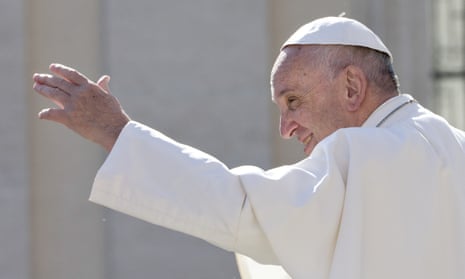Pope Francis has indicated that the Catholic church is prepared to condone artificial contraception to avoid pregnancy in response to the Zika virus, believed to be spread primarily by mosquitoes (though also possibly by sexual contact). Zika is suspected to be the cause of thousands of cases of microcephaly (unusually small heads) and other severe birth abnormalities and conditions, leading desperate women to rush to terminate pregnancies in heavily affected areas such as South America. Many women affected by Zika have been begging for help from outside aid agencies.
Returning to Rome after a visit to Mexico, Francis alluded to an earlier exception issued by Pope Paul VI (permitting nuns in Africa at risk of wartime rape in the 1960s to use birth control), telling reporters that abortion remained a crime and an “absolute evil”, but “avoiding pregnancy is not an absolute evil” and could be “the lesser evil”.
All this talk of “evil” is jarring, but that, and the Vatican’s attitude to abortion, remains fixed. The head of the Catholic church isn’t going to stop believing in evil, or denouncing abortion as a mortal sin, in the near future. Indeed, as gnomic papal announcements go, this is about as direct and encouraging as it gets.
While many Catholics already discreetly protect themselves from pregnancy and disease as they see fit, it would be a mistake to dismiss the church’s international influence, particularly in poor, uneducated communities. Rome’s official stance would also have a beneficial effect on the quality of help and support that somebody could access. However, amid all this tentative positivity, there’s one major, closely related incongruity that’s impossible to ignore. While the response to Zika is encouraging, doesn’t it also serve as a disturbing contrast to the Vatican’s continuing refusal to condone condoms as protection in Aids-afflicted Africa?
Why is “permission” being granted to safeguard against one virus, Zika, but not against HIV and Aids? While Zika is horrific, how many lives has Aids claimed and ruined, including babies who are born HIV-positive? A disgrace, then, that, in all these decades, the issue has been persistently dodged by the Vatican. In 2009, Francis’s predecessor, Pope Benedict XVI, said that the Aids tragedy could not be solved by the distribution of condoms “which even aggravates the problems”. The following year, Benedict conceded that “male prostitutes” could use condoms.
Again, this was welcomed as a positive step (as are any crumbs from Rome’s table on this issue), though Benedict’s stance did nothing to protect women, children or homosexuals who did not care to class themselves as prostitutes. Last year, Francis said that there were more important things to deal with such as malnutrition, a common and unedifying Vatican swerve.
However, now that Zika has been addressed, surely the Catholic church can’t continue to justify this kind of oblique, unhelpful stance. Where Aids is concerned, what’s stopping the Vatican (and its relatively modern-thinking pope) once and for all untying the issue of conception from protection, and acknowledging the entirely separate role of condoms in preventing the spread of disease, not just for male prostitutes, but for all? In a wider way, acknowledging that, in these modern times, “artificial contraception” has uses (preventing disease; preventing pregnancies affected by disease) that extend far beyond their original contraceptive intent and are, therefore, ethically acceptable.
Although it would be ridiculous (and some might say offensive) to think it’s possible to unravel centuries of theological discourse, there seems to be an opportunity here, highlighted by Zika. As demonstrated, even a carefully abstract papal musing on such subjects has a significant ripple effect. As things stand, the Vatican’s response to the Zika crisis has highlighted the ongoing lack of humane response to Aids, and will look more pointed with each passing day.
Cheerio chai latte and good riddance

Is it wrong to gloat over the chai latte furore? For many people, chai latte was the hipster-tastic beverage of choice until Action on Sugar’s study discovered that, in various high street coffee chains, a serving had as much as 13 (Starbucks) to 20 (Costa) teaspoons of sugar. Which was amusing because, for some time, chai latte hasn’t just been a drink, it has been a culture and a blight.
To me, chai latte, in fact chai anything, sums up those people who love to make a big scene about their usually monotonous lifestyle choices, but are simultaneously astonishingly thick. Which means that they do things, eat things and drink things that sound suitably trendy and forward thinking, without being “informed” at all.
In the interests of full disclosure, as a vegetarian (and therefore automatically a giant diet bore in the eyes of many), I once tried some chai porridge, although only a couple of mouthfuls as it tasted suspiciously like wallpaper paste flavoured with existential despair.
With this in mind, could it be considered inevitable that mainstream coffee chains felt that they needed to sweeten the chai consumer experience? Short answer: yes. Could said consumers have guessed that the sweet yummy drink they were purchasing from a pan-global high street chain quite possibly might not have sprung from the earth naturally in that state? Another short answer: derrr.
So excuse people like myself their fleeting moment of schadenfreude. It seems that a particular breed of hipster sermoniser prone to “self-actualising” via the medium of their digestive tracts forgot to ask crucial questions such as: “Hey man, hold the stevia, how much sugar is already in this?” Let’s hope that this particular brand of po-faced sanctimony goes the same way as the chai latte.
A crying shame about Adele and the piano, eh?

Lordy, is Adele still going on about the technical difficulties that marred her Grammys performance? Even after the situation was explained (a microphone falling on piano strings), the lamenting continued. Adele has since told US television host Ellen DeGeneres that she spent a whole day crying about it, but now she feels that she could “cope with anything”.
Well, great, but it’s still odd. Adele endured a poverty-stricken background, a toxic relationship, multitudes of public jibes about her music and her weight and responded with mega-success and a defiant smile. Then a microphone falls on some piano strings and her whole world dissolves?
Yes, it’s high profile, she’s a professional musician and it matters, but not this much. Note to Adele: as an artiste, the way to cope with these horrors is to repeatedly watch the bit in Spinal Tap, where the “pod” doesn’t open during the “mini Stonehenge” performance, laugh like a drain and be thankful that you’ve had your own version. Yes, thankful, because that’s your music biz “blooding” right there. Thus, a live disaster is transformed into an honour and a privilege (and no drummers harmed). Congratulations, Adele, you’ve been Tap-ed.

